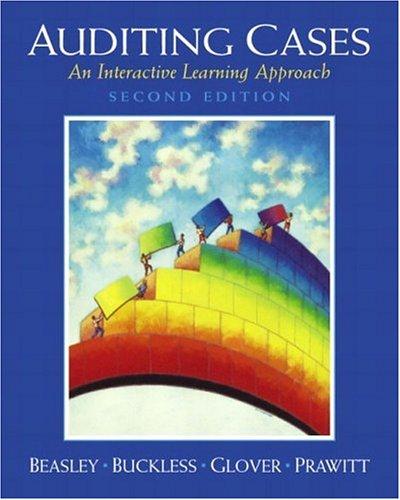Burlington Bees, an independent, minor league baseball team, competes in the Northwest Coast League. The team finished
Question:
Burlington Bees, an independent, minor league baseball team, competes in the Northwest Coast League. The team finished in second place in 2002 with a 87-57 record. The Bees' 2002 cumulative season attendance of 434,348 spectators set a new record high for the team, up from 390,000 in 2001.
Bank-loan covenants require the Bees to submit audited financial statements annually to the bank. The accounting firm of Hickman and Snowden, CPAs, has served as the Bees' auditors for the past five years.
One of the major audit areas involves testing ticket revenues. Those revenues reached nearly \(\$ 1.9\) million in 2001. In prior years, the audit plan called for extensive detail testing of revenue accounts to gain assurance that reported ticket revenues were fairly stated.
Michelle Kramme, a new audit manager, just received the assignment to be the manager on the 2002 audit. Michelle worked previously on the Bees' prior-year audits as a staff auditor. When she learned she would be managing the current-year engagement, she immediately thought back to all the hours of detailed testing of ticket sales she performed. On some of her other clients, Michelle has been successful at redesigning audit plans to make better use of analytical procedures as substantive tests. She is beginning to wonder if there is a more efficient way to gather substantive evidence related to ticket revenues on the Bees' engagement.
In her first meeting with Bees' management for the 2002 audit, Michelle learned that the Bees now use an outside company, Tickets R Us, to operate ticket gates for home games. The terms of the contract requires Tickets R Us to collect ticket stubs so that they can later report total tickets collected per game. While Tickets R Us does not break down the total ticket sales into the various price categories, Michelle thinks there may be a way to develop an analytical procedure using the independently generated total ticket numbers and data from prior audits. To investigate this possibility, Michelle asked a staff person to gather some information related to reported sales. Here is the information the staff person gathered from the records of the client, Tickets R Us, and prior-year audit files:


REQUIREMENTS
1. Using the information provided, please develop an expectation for ticket revenues for the 2002 fiscal year.
2. How close would the Bees' reported ticket revenue have to be to your expectation for you to consider reported ticket revenue reasonable or fairly stated? If reported ticket revenues are outside your "reasonableness range," what could explain the difference?
3. What are the advantages of using analytical procedures as substantive tests? If the engagement team decides to use analytical procedures for the Bees' audit, how will the audit plan differ from prior years? Discuss whether you believe that analytical procedures should be used as substantive tests for the Bees 2002 audit?
Step by Step Answer:

Auditing Cases An Active Learning Approach
ISBN: 9781266566899
2nd Edition
Authors: Mark S. Beasley, Frank A. Buckless, Steven M. Glover, Douglas F. Prawitt





